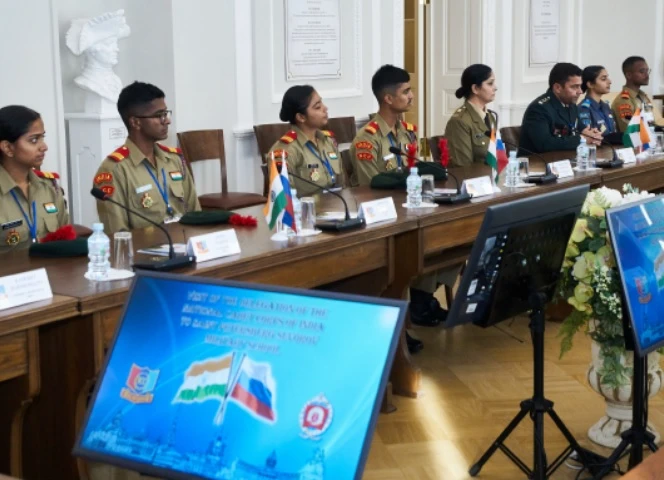A delegation from the National Cadet Corps (NCC) of India is currently visiting the St. Petersburg Suvorov Military School as part of an exchange visit to Russia.
India’s young ambassadors are studying the customs and cultural traditions of Russia while at the same time, giving a glimpse of India’s rich cultural heritage.
During their visit, which will last until October 4, the delegation consisting of five boys, five girls and two teachers, would have visited the State Museum of the History of St. Petersburg ‘Peter and Paul Fortress’, Petrodvorets, St. Isaac’s Cathedral, the Hermitage, the State Museum Reserve ‘Tsarskoe Selo’ in Pushkin, a tour of Kronstadt, museums and reserves of St. Petersburg, excursions along the rivers and canals of the city, as well as acquaintance with the St. Petersburg city administration.
Our cadets took India with them when they went to Russia. Our culture and vibrance was presented so eloquently at the Survrov Military School in St Petersburg Russia, that it mesmerized all. #Yep
@IndEmbMoscow pic.twitter.com/OUV02cAaIT— National Cadet Corps (@HQ_DG_NCC) October 1, 2023
In January, Russian cadets from Suvorov Military School and students of the boarding school of the Russian Ministry of Defence had for the first time taken part in the festive events dedicated to the 75th anniversary of the National Cadet Corps of India.
The Russian delegation had a sightseeing tour of New Delhi and visited Agra besides also visiting the National Institute of Yoga.
Exchange of visits by cadets from India and Russia under the NCC Youth Exchange Programme have taken place since 2003, with Indian NCC delegations being hosted by their Russian counterparts in Belgorod, Kursk, Perm, Smolensk, St. Petersburg and Volgograd.
Youth exchanges like these reinforce, at the people-to-people level, the strong bonds of friendship and goodwill that have traditionally existed between India and Russia.
Our young ambassadors, on an exchange visit to Russia, got an opportunity to witness the Russian Heritage, culture and drills. An opportunity like firing a Canon Shot from the Naryshkin Bastion at Peter at Paul Fortress is rare and a unique experience. pic.twitter.com/CCkNVzzxw0
— National Cadet Corps (@HQ_DG_NCC) September 26, 2023
The National Cadet Corps is the largest uniformed youth organisation in the world and functions under the Ministry of Defence.
The genesis of the corps can be traced to the period of the First World War, when the British created a ‘University Corps’ aimed at harnessing the youth of India to meet their ever-increasing requirement of manpower in the Armed Forces.
The Youth Exchange Programme (YEP) is instrumental in shaping young minds by exposing them to the rich and diverse heritage of cultures, which further enables deeper and stronger relations in the future.




















